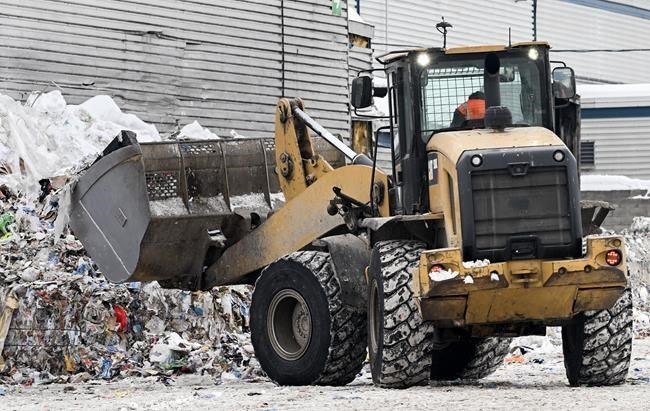OTTAWA — Most federal programs aimed at reducing plastic waste are working, but the government isn't measuring its progress toward its overall goal of zero plastic waste by 2030, according to a new audit from Canada's environment commissioner.
The government launched an initiative in 2019 to create a circular economy for plastics by 2030 — meaning nothing goes to waste.
In his audit released Tuesday, environment commissioner Jerry DeMarco found that waste-reduction efforts in key federal departments were generally working well.¬Ý
That included efforts by the Fisheries Department, which is meeting its targets to remove lost or discarded fishing gear ‚Äî also known as ghost gear ‚Äî from the water.¬Ý
Environmental groups estimate as much as three-quarters of the plastic in the world's oceans comes from abandoned or lost fishing nets and related gear.
However, DeMarco said the government doesn't have clear targets and monitoring systems to know whether it's on track to meet the goal of zero plastic waste overall.
"Until this is done, they will not know whether they are on track to meeting the goal," the report said.
DeMarco said tracking is especially important because reaching the goal will require co-ordination from the provinces and territories, municipalities and the private sector.
Statistics Canada's most recent report on where plastic ends up was released in March, and the most recent data it included were from 2020.¬Ý
If methods don't change, it will be 2034 before StatCan has information about the 2030 target.
DeMarco called on the agency to prioritize the data.¬Ý
The audit noted that the federal public plastics registry will help fill the data gap.¬Ý
That program, announced last week by Environment Minister Steven Guilbeault on the sidelines of UN negotiations toward an international plastics treaty, will require plastic producers to report on what they're making and where it ends up.
Environment and Climate Change Canada has agreed to a series of recommendations, including creating a data framework by March 2025 to measure progress toward the zero-waste goal.¬Ý
DeMarco also issued a report assessing the Innovation, Science and Economic Development Department's $8-billion Net Zero Accelerator fund and found it had "significant shortcomings."
The department is not tracking the program's value for money in actually reducing emissions, the report said.¬Ý
The program has allocated funding to 17 projects, but only five of those included a signed commitment to reduce a specific amount of emissions.¬Ý
The audit calculated the cost of reductions for those five projects at $143 per tonne, but the remaining 12 projects were estimated to cost $523 per tonne because they didn't have specific targets.¬Ý
Overall, the fund has only achieved a six-megatonne reduction in greenhouse-gas emissions.
"To put it in perspective, six megatonnes is less than one per cent of total emissions in Canada. So they really do need to attract the large emitters to get more bang for their buck," DeMarco said.¬Ý
The program was also cumbersome to apply for, with companies spending, on average, 407 hours to complete the application and 20 months to complete the full process.¬Ý
Of the 55 large emitters in the country, only 15 applied for the funding — and just two signed on.
In a separate report released Tuesday, DeMarco found the Agriculture Department has no strategy to meet Canada's 2030 or 2050 climate targets four years after it was first directed to create one.
The federal government called for such a strategy in the 2020 fall economic statement and again in 2021, and DeMarco said he was surprised and disappointed to see it still had not happened.¬Ý
"It wouldn't be such a problem if we saw that the programs were making strong headway already in the absence of a strategy," DeMarco said.¬Ý
Without a strategy in place, the department has been undertaking "extensive science-based work," but DeMarco said there's no way of knowing if that work is overlapping.¬Ý
The agriculture sector accounted for about 10 per cent of the country's total greenhouse-gas emissions in 2021.¬Ý
The federal plan for meeting the 2030 emissions reduction targets lays out a sector-by-sector path forward.¬Ý
The audit noted that through its various programs, the Agriculture Department estimated that by 2030 the sector will cut its emissions by 11.21 million tonnes, which is less than the 13 million tonnes it estimated in 2022.
One reason for that change is because the department initially included emission reduction estimates from tree planting on agricultural lands, but later removed them.¬Ý
So far, DeMarco said, the sector has achieved less than one megatonne of emissions reduction — about two per cent of its target.
The audit looked at three programs aimed at cutting methane emissions and found that they "had not yet quantified any expected greenhouse-gas emission reductions from their projects" to help meet Canada's goal of reducing such emissions by 30 per cent below 2022 levels by 2030.
DeMarco is calling on the department to establish a sustainable agriculture strategy that includes measurable outcomes and reporting on the cost of mitigation programs.
Adam van Koeverden, the parliamentary secretary to the environment minister, said work on a strategy is underway.¬Ý
"Our government is being pushed in the right direction toward more action, more efficient work," he said.¬Ý
The federal government says it has accepted the commissioner's recommendations.
This report by The 91‘≠¥¥ Press was first published April 30, 2024.
Sarah Ritchie, The 91‘≠¥¥ Press



